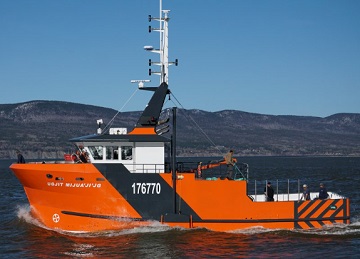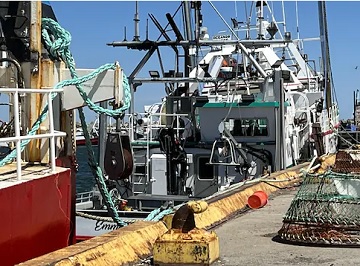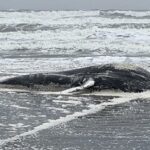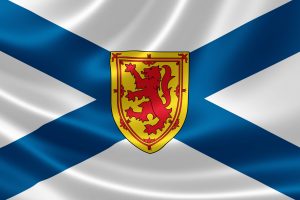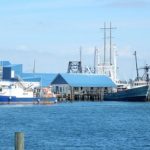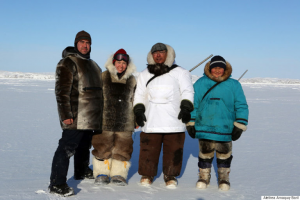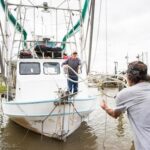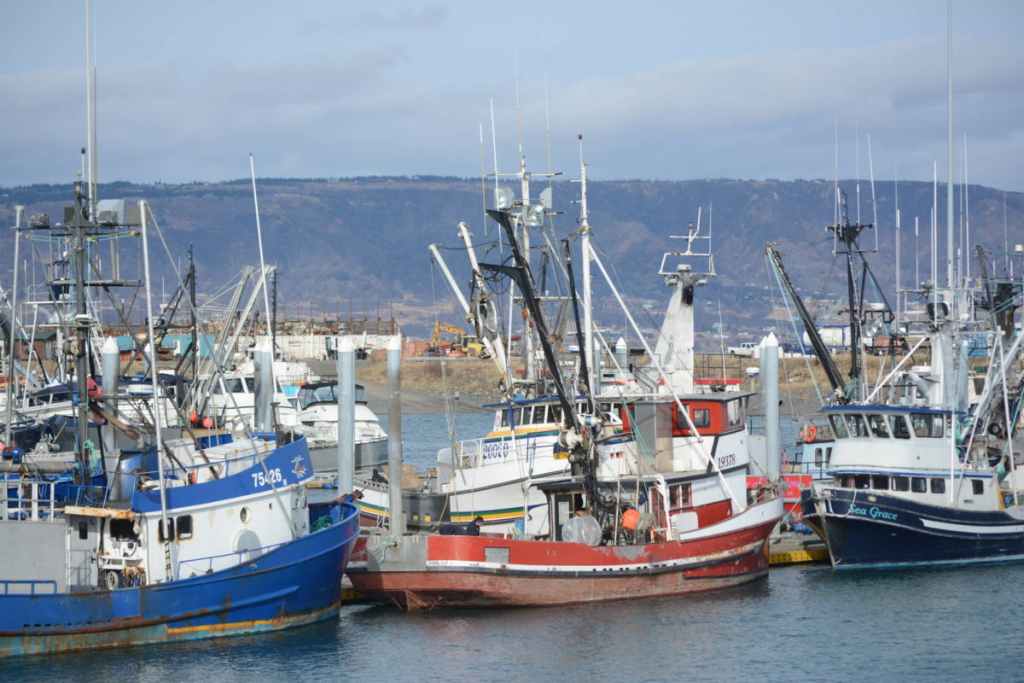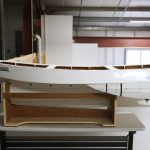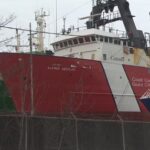Tag Archives: Quebec
Lobster harvesters in Atlantic Canada to vote on increasing minimum legal size this year
 At stake is maintaining access to the United States market. “It will be an individual vote. That’s a big decision that every single enterprise and owner has to look at from their own business,” said Heather Mulock, executive director of the Coldwater Lobster Association, which represents fishermen in lobster fishing area 34 (LFA 34). In late May or June, the 979 licence holders in the area will be asked to vote on whether to match increases in allowable U.S. catch measurements that will come into effect Jan. 1, 2025, and again in 2027. Live Canadian lobster that fall under the new limits would not be allowed into the U.S. That includes bonded shipments of lobster under the new minimum in the U.S., according to an information package sent to fishermen in southwestern Nova Scotia. That could block trucking of “undersized” Canadian lobster across the border for flights to Asia from airports in Boston or New York. more, >>click to read<< 08: 57
At stake is maintaining access to the United States market. “It will be an individual vote. That’s a big decision that every single enterprise and owner has to look at from their own business,” said Heather Mulock, executive director of the Coldwater Lobster Association, which represents fishermen in lobster fishing area 34 (LFA 34). In late May or June, the 979 licence holders in the area will be asked to vote on whether to match increases in allowable U.S. catch measurements that will come into effect Jan. 1, 2025, and again in 2027. Live Canadian lobster that fall under the new limits would not be allowed into the U.S. That includes bonded shipments of lobster under the new minimum in the U.S., according to an information package sent to fishermen in southwestern Nova Scotia. That could block trucking of “undersized” Canadian lobster across the border for flights to Asia from airports in Boston or New York. more, >>click to read<< 08: 57
No signs of herring stocks rebounding 2 years into moratorium, DFO says
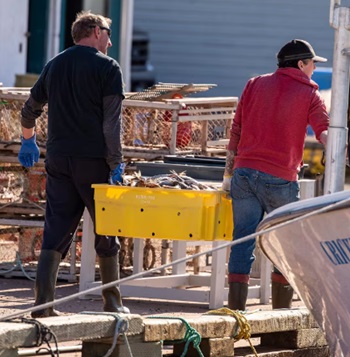 Two years into a moratorium on the East Coast’s spring herring fishery, biologists say the stock isn’t improving. Fisheries and Oceans Canada put a moratorium on fishing for herring in the Gulf of St. Lawrence, and on the mackerel fishery in Atlantic Canada and Quebec, on March 30, 2022. At the time, the department said urgent action had to be taken to give the stocks a chance to recover and to ensure the long-term sustainability and prosperity of East Coast fisheries. DFO biologist Laurie Maynard said that over the last two years of evaluation, the herring stock has plateaued at around 30,000 tonnes, but isn’t showing signs of growth. more, >>click to read<< 14:58
Two years into a moratorium on the East Coast’s spring herring fishery, biologists say the stock isn’t improving. Fisheries and Oceans Canada put a moratorium on fishing for herring in the Gulf of St. Lawrence, and on the mackerel fishery in Atlantic Canada and Quebec, on March 30, 2022. At the time, the department said urgent action had to be taken to give the stocks a chance to recover and to ensure the long-term sustainability and prosperity of East Coast fisheries. DFO biologist Laurie Maynard said that over the last two years of evaluation, the herring stock has plateaued at around 30,000 tonnes, but isn’t showing signs of growth. more, >>click to read<< 14:58
Closure of Eastern Seafood | The end for Matane shrimp?
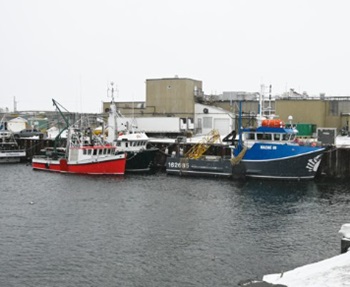 A few days before the start of the fishing season, the oldest shrimp processing plant in Quebec closes its doors. The Danish company Royal Greenland announced on Monday that it was closing down the Eastern Seafood processing plant. The mayor of Matane, Eddy Métivier, speaks of “a total surprise” as the Danish company had recently invested millions to add lobster and crab processing to its activities, in addition to building 71 housing units for its temporary workers. “We are in shock, it’s really a hard blow,” he said in an interview. It is a symbol for Matane. It’s like putting an end to historical fishing traditions. In this sense, too, it is a mourning. more, >>clicck to read<< 14:29
A few days before the start of the fishing season, the oldest shrimp processing plant in Quebec closes its doors. The Danish company Royal Greenland announced on Monday that it was closing down the Eastern Seafood processing plant. The mayor of Matane, Eddy Métivier, speaks of “a total surprise” as the Danish company had recently invested millions to add lobster and crab processing to its activities, in addition to building 71 housing units for its temporary workers. “We are in shock, it’s really a hard blow,” he said in an interview. It is a symbol for Matane. It’s like putting an end to historical fishing traditions. In this sense, too, it is a mourning. more, >>clicck to read<< 14:29
Warming waters send Gaspé’s northern shrimp stock plummeting, spelling trouble for Quebec fishermen
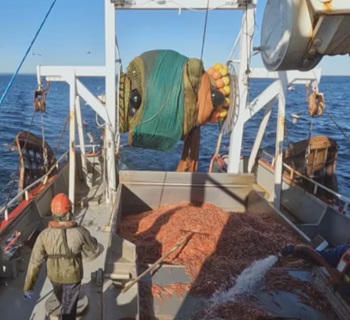 Every year, Fourchette Bleue, which promotes what it calls “under-exploited” marine species in the St. Lawrence for consumption, releases a list of recommended sustainable seafood products for consumers. Toad crabs, oysters and green sea urchins all made the cut this year, but for the first time, the northern shrimp did not. That’s because stocks of the shrimp have taken a major dive in recent years, causing concern in the local fishing industry as Fisheries and Oceans Canada (DFO) floats the idea of potentially closing fisheries in the near future. more, >>click to read<< 07:28
Every year, Fourchette Bleue, which promotes what it calls “under-exploited” marine species in the St. Lawrence for consumption, releases a list of recommended sustainable seafood products for consumers. Toad crabs, oysters and green sea urchins all made the cut this year, but for the first time, the northern shrimp did not. That’s because stocks of the shrimp have taken a major dive in recent years, causing concern in the local fishing industry as Fisheries and Oceans Canada (DFO) floats the idea of potentially closing fisheries in the near future. more, >>click to read<< 07:28
Gulf of St. Lawrence redfish population in decline even before fishery reopens, report finds
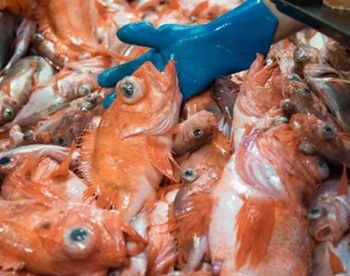 The latest scientific assessment of the redfish population in the Gulf of St. Lawrence has sobering news even as fishing groups in Atlantic Canada and Quebec fight over who will get to catch it: their numbers are rapidly shrinking. “I think we’re at the point that we’re clearly seeing that there’s a limit to this boom,” says federal scientist Caroline Senay, the redfish specialist at the Department of Fisheries and Oceans (DFO). The report comes in advance of DFO’s plan to reopen the fishery later this year after it collapsed in the early 1990s and has been closed since 1995. more, >>click to read<< 09:20
The latest scientific assessment of the redfish population in the Gulf of St. Lawrence has sobering news even as fishing groups in Atlantic Canada and Quebec fight over who will get to catch it: their numbers are rapidly shrinking. “I think we’re at the point that we’re clearly seeing that there’s a limit to this boom,” says federal scientist Caroline Senay, the redfish specialist at the Department of Fisheries and Oceans (DFO). The report comes in advance of DFO’s plan to reopen the fishery later this year after it collapsed in the early 1990s and has been closed since 1995. more, >>click to read<< 09:20
Ottawa revamps redfish allocation in Gulf of St. Lawrence, but N.S. keeps largest share
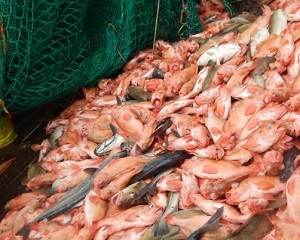 Following months of anticipation and lobbying in Quebec, Newfoundland and Labrador, and Nova Scotia, the federal government has announced how it will allocate fishing access to the redfish population in the Gulf of St. Lawrence. The allocations were announced on Friday by Fisheries Minister Diane Lebouthillier at a news conference in Gaspé, Que. Under the new terms, Nova Scotia will continue to receive the largest portion of the allocation, but it appears the province has received in the past will decline. It is unclear by how much. more, >>click to read<< 15:55
Following months of anticipation and lobbying in Quebec, Newfoundland and Labrador, and Nova Scotia, the federal government has announced how it will allocate fishing access to the redfish population in the Gulf of St. Lawrence. The allocations were announced on Friday by Fisheries Minister Diane Lebouthillier at a news conference in Gaspé, Que. Under the new terms, Nova Scotia will continue to receive the largest portion of the allocation, but it appears the province has received in the past will decline. It is unclear by how much. more, >>click to read<< 15:55
Hundreds of jobs, industry stability at stake in pending Atlantic Canada fishery decision
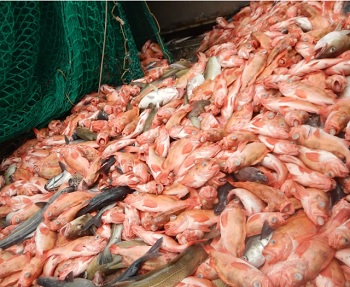 The Trudeau government is poised to allocate fishing access to the massive redfish population in the Gulf of St. Lawrence at the end of the month, a highly anticipated decision generating both dread and hope throughout the industry in Quebec and Atlantic Canada. Nova Scotia, which has the most to lose, is warning Ottawa that “hundreds of jobs” are at stake if it loses its long-standing share of the fishery. Now that the redfish population is estimated to weigh in at a whopping four million metric tonnes, Scotia Harvest and the other Nova Scotia operators are looking nervously at other provinces lobbying for access. Quebec and Newfoundland and Labrador interests, to take one example, are lobbying for a piece of the action to compensate for a drastic reduction in shrimp quota for fleets in their province. more, >>click to read<< 09:06
The Trudeau government is poised to allocate fishing access to the massive redfish population in the Gulf of St. Lawrence at the end of the month, a highly anticipated decision generating both dread and hope throughout the industry in Quebec and Atlantic Canada. Nova Scotia, which has the most to lose, is warning Ottawa that “hundreds of jobs” are at stake if it loses its long-standing share of the fishery. Now that the redfish population is estimated to weigh in at a whopping four million metric tonnes, Scotia Harvest and the other Nova Scotia operators are looking nervously at other provinces lobbying for access. Quebec and Newfoundland and Labrador interests, to take one example, are lobbying for a piece of the action to compensate for a drastic reduction in shrimp quota for fleets in their province. more, >>click to read<< 09:06
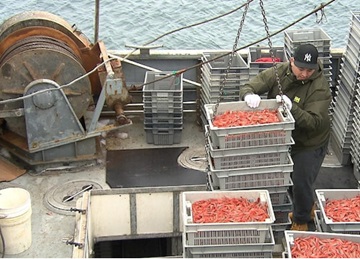
Northern Shrimp fishing: DFO proposals do not pass muster in the industry
Northern shrimp fishermen from Quebec and the Atlantic wholeheartedly reject the new precautionary approach presented by Fisheries and Oceans Canada (DFO) scientists to protect stocks. The fishing associations of Quebec, New Brunswick and Newfoundland and Labrador, industrialists and DFO scientists were gathered during two days for the advisory committee which ended Wednesday in Quebec. Northern shrimp stocks in the Estuary and Gulf of St. Lawrence are not likely to improve, according to Fisheries and Oceans Canada. >>click to read<< 11:47
Shrimp fishing: gloomy outlook and angry fishermen
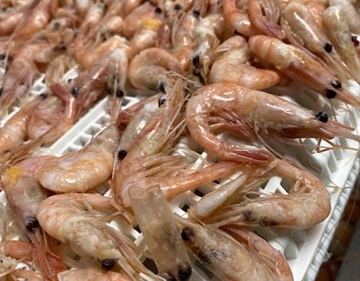 The state of northern shrimp stocks in the estuary and Gulf of St. Lawrence will not improve in the short and medium term and could even continue to deteriorate. It is this grim observation that Fisheries and Oceans Canada shared with the fishermen and processors gathered Tuesday in Quebec for the first day of the shrimp advisory committee of the Estuary and Gulf of Saint -Laurent. DFO biologists have clearly identified redfish predation as one of the main causes of the decline of shrimp stocks in the four fishing areas of the Estuary and Gulf. The warming of the water in the Gulf and the significant drop in oxygen levels also explain the drastic fall in northern shrimp stocks.>>click to read<<14:12
The state of northern shrimp stocks in the estuary and Gulf of St. Lawrence will not improve in the short and medium term and could even continue to deteriorate. It is this grim observation that Fisheries and Oceans Canada shared with the fishermen and processors gathered Tuesday in Quebec for the first day of the shrimp advisory committee of the Estuary and Gulf of Saint -Laurent. DFO biologists have clearly identified redfish predation as one of the main causes of the decline of shrimp stocks in the four fishing areas of the Estuary and Gulf. The warming of the water in the Gulf and the significant drop in oxygen levels also explain the drastic fall in northern shrimp stocks.>>click to read<<14:12
3 victims identified after fishing boat sinks near Quebec’s Lower North Shore
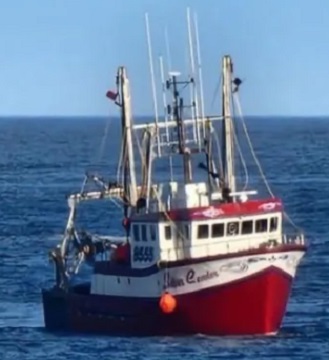 Quebec provincial police have identified the three people who died after a fishing vessel capsized and sank in the Gulf of St. Lawrence near Quebec’s Lower North Shore. Dean Lavallée, 53, Yves Jones, 65, and Damon Etheridge, 36, were all from Blanc-Sablon, Que. The three men were among six people aboard the 18-metre-long Silver Condor sailing near La Tabatière, Que., early Monday morning. Lavallée owned and operated the Silver Condor. The crew left Friday to look for redfish and were on their way back when the ship sank, said Blanc-Sablon Mayor Andrew Etheridge, who is a cousin of Damon Etheridge. “He’s just the kind of guy who puts other people before him,” Etheridge said of his cousin. >>click to read<< 15:47
Quebec provincial police have identified the three people who died after a fishing vessel capsized and sank in the Gulf of St. Lawrence near Quebec’s Lower North Shore. Dean Lavallée, 53, Yves Jones, 65, and Damon Etheridge, 36, were all from Blanc-Sablon, Que. The three men were among six people aboard the 18-metre-long Silver Condor sailing near La Tabatière, Que., early Monday morning. Lavallée owned and operated the Silver Condor. The crew left Friday to look for redfish and were on their way back when the ship sank, said Blanc-Sablon Mayor Andrew Etheridge, who is a cousin of Damon Etheridge. “He’s just the kind of guy who puts other people before him,” Etheridge said of his cousin. >>click to read<< 15:47
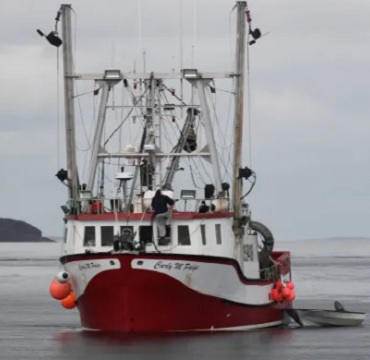
3 dead after boat sinks near Quebec’s Lower North Shore
Three people are dead after a fishing vessel capsized and sank just off La Tabatière, on Quebec’s Lower North Shore, Quebec provincial police say. Three others were taken to hospital in Corner Brook, N.L. The Canadian Coast Guard says the vessel was the F/V Silver Condor, from Blanc-Sablon, Que. A distress signal was received around 2:30 a.m. Monday morning. Six ships from the Department of National Defence and the Canadian Coast Guard took part in the search. The ship went down about 25 kilometres off shore, in the Gulf of St. Lawrence. >>click to read<< 16:40
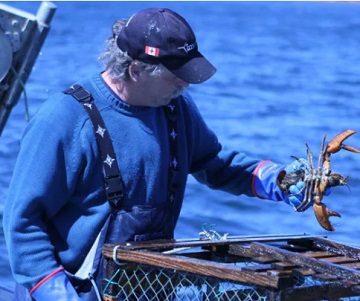
Watching my brother-in-law build his lobster traps by hand taught me the value of old ways
As a kid, I remember lying across the seat of a white rowboat in the hot sun during my summer holidays. In 2006, what seemed like a lifetime later, I was having one of my first quick chats with my future brother-in-law, on the weekend that he and my sister Kathy were getting married. Michael Sullivan is a lobster fisherman. Wearing his preferred black ball cap and sporting a chevron mustache, he catches enough lobster and fish to make a living. He told me about his greatest heartache, that the lobster fishery is a disaster, with catches getting smaller and smaller. But two daughters and 11 years later, things had taken a surprising turn. Michael had been upping his catch, substantially, every year. He had gone back to the “old ways” — building his own wooden traps. Photos, >click to read< 09:01

Canada: Positioning for redfish re-opening
Canada’s commercial fishery for redfish in the Gulf of St. Lawrence has remaind closed since 1995 to allow redfish stocks rebuild to healthy levels. Now the authorities are positioning to re-open the Unit 1 redfish commercial fishery in Atlantic Canada and Quebec in the near future. The announcement has been made by Minister of Fisheries Joyce Murray that in preparation for a pending commercial fishery, the 2023 experimental fishery for Unit 1 redfish will be increased from 2500 to 5000 tonnes. Twenty-four individuals and groups from Quebec, New Brunswick, Prince Edward Island, Nova Scotia and Newfoundland and Labrador have been approved to participate, five of which are Indigenous groups. >click to read< 07:48
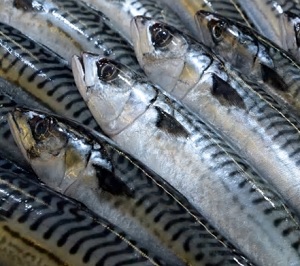
Atlantic mackerel moratorium extended for 2023 season
Fisheries and Oceans Canada has extended the closure of Atlantic mackerel commercial and bait fishing in Atlantic Canada and Quebec for the 2023 season. In a notice to fish harvesters on Wednesday, the federal department said it was continuing the moratorium “to allow the stock to rebuild.” The moratorium has been in place since March 2022. In its notice, Fisheries and Oceans Canada said results of a Canadian stock assessment found Atlantic mackerel “declined further in the critical zone since the last assessment, with spawning stock biomass at its lowest-observed value.” The critical zone means serious harm is occurring. >click to read< 18:36
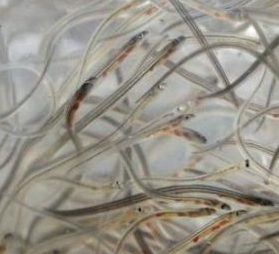
For Atlantic Canada, Fishing Season Brings Yet More Violence
In the early morning dark of April 12, 2023, violence erupted along a Nova Scotia riverbank after a man engaged a woman and a youth in a heated argument. Soon after, seven people arrived. One allegedly assaulted the man with a pipe while another stood nearby wielding a knife and a taser. When the RCMP later arrested two members of the group a short distance away, the officers found two shotguns and a taser. Conflict around elvers is not new, nor is it the only fishery in Atlantic Canada that’s seen so much turmoil. Whether it’s around elvers, lobsters, or something else, “this will continue to play out, and play out, and play out, until the government deals with the issues on the table.” >click to read< 08:05
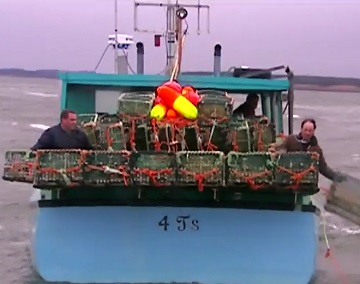
The $200 million lobster season is underway in Quebec
The lobster season is underway in Quebec, starting with Saturday’s launch in the Gaspé Peninsula. “For the past 11 years, lobsters caught near the coasts of the Gaspé and Anticosti Island have been marked with an alphanumeric code, which allows consumers to trace the origin of the lobster on their plates, and even to know the name of the fisherman, the boat and the area in which it was caught,” said the Ministry of Agriculture, Fisheries and Food (MAPAQ) in a news release. Approximately 1,500 fishermen earn their living from lobster fishing in Quebec, according to the most recent data from MAPAQ. Video, >click to read< 14:20

“The market has collapsed.” With crab season on the line, seafood producers’ association digs in its heels on price
Jeff Loder, executive director of the Association of Seafood Producers said Monday the crab market has softened in the past few weeks, and the group will not negotiate a new price with fishermen. “The market has collapsed. Prices need to reflect that,” he said. Loder said each day the industry is delayed, with fishermen in the Maritimes and Quebec already out on the water, the worse it is for everyone. “Snow crab is not selling. There’s a glut in inventory,” said Loder, speaking for the first time since the provincial price-setting panel set a minimum price of $2.20 Cdn per pound for harvesters, who responded with protests and say they can’t afford to fish for that price. “We need raw material to get those plants going, and to have any chance to compete with our competitors in Atlantic Canada, who are all fishing in Quebec, New Brunswick, Nova Scotia and P.E.I. at $2.25 a pound,” Video, >click to read< 16:00
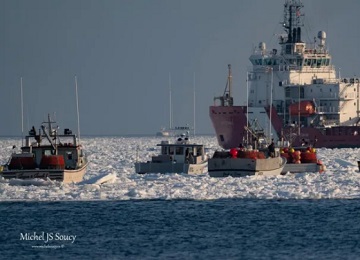
Cape Breton fishermen say ice was a problem because DFO didn’t follow its own policy
Some Cape Breton fishermen say if the Department of Fisheries and Oceans hadn’t opened the Gulf of St. Lawrence snow crab season too early, icebreakers would not have been needed to get boats in and out of Cheticamp harbour. Andrew Bourgeois, president of the Gulf of Nova Scotia Fishermen’s Coalition and a director of the Gulf fleet planning board, said DFO officials usually agree to wait until all the coasts are ice-free, but not this year. “I think if DFO would have followed their protocol, I don’t think there would have been an issue with the ice,” he said. “The protocol says that if there was ice at 20 fathoms or deeper that it shouldn’t open, it wouldn’t open. And they opened it anyways.” >click to read< 13:11

FFAW wants mackerel fishery re-opened
On Thursday, Mar. 30, 2022, the Department of Fisheries and Oceans Canada (DFO) issued a release announcing there would be no directed commercial or bait fishing for southern Gulf spring herring and the closure of the Atlantic mackerel commercial and bait fisheries in Atlantic Canada and Quebec. Now in 2023, Fish, Food, & Allied Workers (FFAW) is calling on the government to reopen the Atlantic mackerel fishery, stating that Newfoundland and Labrador communities shouldn’t bear the burden of this decision. “The biggest problem is that the fishery was closed when it should not have been,” said Courtney Glode, Communications Officer with FFAW. The U.S.A. announced in March that they will proceed with the commercial fishery in 2023, on the East Coast stock shared with Canada; however, an announcement on whether or not the moratorium will be lifted in Canada has not yet been made. >click to read< 10:07
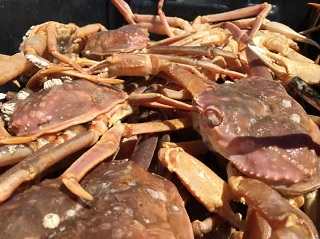
Crab Fishermen stay in boats on the north coast
Unsatisfied with the prices offered to them by the mill owners, most of the crab fishermen in 16 areas on the north shore did not go to sea on Saturday when fishing began in their field. 39 owners of 54 fishing licenses in Area 16 feel hurt by the temporary price of $2.25 per pound offered by the mills and accepted by fishermen in other parts of New Brunswick, Nova Scotia and Quebec. According to these fishermen, the only people in the province to group around the marketing group are not honoring the price formula that allows processors to get more than $2.25 a pound. According to their representative Jean-René Boucher, all factories in the province, including the six located on the north coast, have been issued with a watchword by the Fishing Industry Association not to accept crabs from area 16. >click to read< 10:38
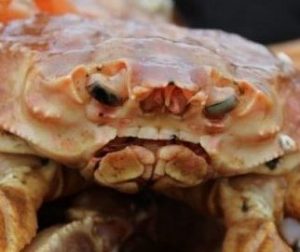
Starvation price for snow crab fishermen
A week into the snow crab fishing season, processors in Quebec, New Brunswick and Nova Scotia on Friday agreed to a temporary dock price of $2.25/lb to $2.50/lb. “There’s more inventory on the market now than we thought, says Jean-Paul Gagne, Director General of the Quebec Fisheries Industry Association (AQIP). For his part, Marc-Olivier des Îles-de-la-Madeleine’s captain, Marco Turbide, promises to put his cages back this spring. “Expecting a price of only two or three dollars a pound doesn’t give ambition, he comments. It’s not fun. For a heavily indebted fisherman like me, we can’t expect to make a profit in 2023 because of the significant loss from crab last year. If we agree to $4/lb, I’m very I’ll be happy!” >click to read< 11:45
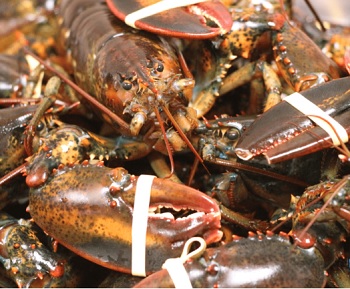
Canadian Lobster Industry Implements Elog JOBEL
Electronic logbooks (Elog) for fisheries are essential for the timely processing and analysis of capture declarations and the sustainable management of Canadian fisheries. Since 2018 in Québec, fishers using JOBEL have demonstrated their fishing activity is compliant with national and international requirements. In the Department of Fisheries and Oceans, fishers, harvesters and scientists now have the information required to evaluate the durability of the Québec lobster fishery. Lobster fishers and harvesters in the Gaspe area now provide the Marine Stewardship Council with accurate information impacting other species during the certification process for their spring fishery. >click to read< 09:41

Canadian Lobster Fishermen Move Towards Electronic Declarations
Electronic logbooks for fisheries are essential for timely processing and analysis of capture declarations and the sustainable management of Canadian fisheries. Since 2018 in Québec, fishermen using JOBEL have demonstrated that their fishing activity is compliant with national and international requirements. Also, Department of fisheries and Oceans, the fishermen and scientists now have the information needed to evaluate the durability of the Québec lobster fishery. Indeed, lobster fishermen in the Gaspe area greatly benefited from being able to provide the Marine Stewardship Council with accurate information on the impact on other species during the certification process for their spring fishery. >click to read< 11:29
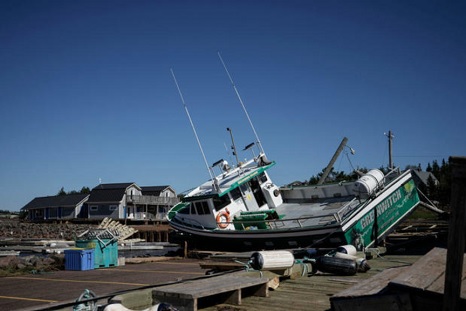
Body found as Canada struggles to restore power after storm – ‘Everything is unusable’
Hundreds of thousands of people in Atlantic Canada remained without power Sunday and officials said they found the body of a woman swept into the sea after former Hurricane Fiona washed away houses, stripped off roofs and blocked roads across the country’s Atlantic provinces. After surging north from the Caribbean, Fiona came ashore before dawn Saturday as a post-tropical cyclone, battering Nova Scotia, Prince Edward Island, Newfoundland and Quebec with hurricane-strength winds, rains and waves. >click to read<
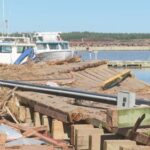 ‘Everything is unusable’: Fishers, farmers assess damage as Fiona wreaks havoc on industry – Officials have said areas exposed to storm surges have seen the most severe damage from the storm. In Morell, the Red Head Harbour wharf was almost completely totalled. Ken Drake was one of the fishers who spent Friday night there keeping an eye on their boats. He said all the boats have at least some damage. >click to read< 08:05
‘Everything is unusable’: Fishers, farmers assess damage as Fiona wreaks havoc on industry – Officials have said areas exposed to storm surges have seen the most severe damage from the storm. In Morell, the Red Head Harbour wharf was almost completely totalled. Ken Drake was one of the fishers who spent Friday night there keeping an eye on their boats. He said all the boats have at least some damage. >click to read< 08:05
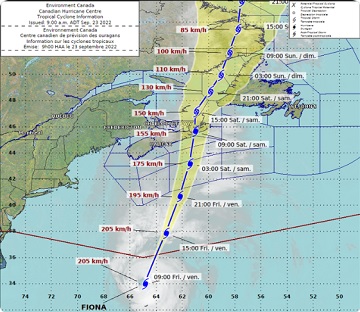
Canadian Hurricane Centre says Hurricane Fiona will be ‘historic, extreme event’
The Canadian Hurricane Centre says Hurricane Fiona will make landfall in eastern Nova Scotia as a powerful post-tropical storm early Saturday. In a Friday afternoon briefing, Bob Robichaud, a warning preparedness meteorologist with the centre, cautioned people not to focus on the hurricane’s track since its effects will be felt across a swath of eastern Canada. Environment Canada says this includes much of Nova Scotia, P.E.I., southeastern New Brunswick, western and southwestern Newfoundland, and some parts of Quebec bordering the Gulf of St. Lawrence. >click to read< – Current Hurricane Conditions – Environment Canada (weather.gc.ca) 13:54

Bloc Québécois wants more squid fishing after feds cut herring quota
Bloc Québécois Leader Yves-François Blanchet asked Fisheries and Oceans Canada on Sunday to allow squid fishing to compensate for the decrease in quotas for the fall herring announced a few days earlier. On Friday, minister Joyce Murray announced that the total allowable catch for the fall herring in the Gulf of St. Lawrence would decrease to 10,000 tonnes from 12,000 tonnes to preserve the population. “We leave the fishers without notice in an economic situation that is not good for them, in a sector that is already fragile,” Blanchet said, explaining that adding squid quotas would offer them an alternative “that uses the equipment they already have and that has a domestic Quebec market that will consume all the products, while not risking biodiversity or costing the government anything. >click to read< 07:40

A seafood processor from the Îles-de-la-Madeleine in serious financial difficulty
With an estimated debt of between $3.5 million and $4 million to its lobster fishermen, the Madelinan seafood processing company LA Renaissance des Îles (LRDI) has decided to place itself under the protection of the Act respecting the ‘insolvency. This is what the president and CEO and sole shareholder, Lynn Albert, announced to the fishermen who supply her with lobster, during an information meeting held on Friday morning, learned the QMI Agency. LRDI is in default of payment for its dockside purchases from 66 fishermen for the last two weeks of the 2022 fishing season, totaling $3.7 million. Added to this are, among other things, deductions for government rebates and other operating expenses of fishing businesses. >click to read< 07:34
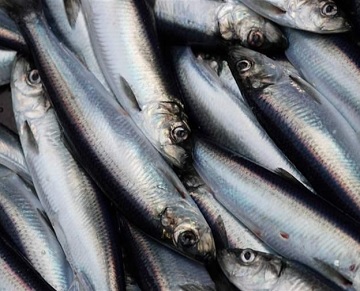
TAC goes from 12,000 to10,000 tonnes – Reduction to herring quota will impact Maritimes, Quebec
The quota for major parts of the herring fishery in the Maritimes and Quebec is being reduced in an effort to increase the stock. The total allowable catch for herring in the southern Gulf of St. Lawrence fishing zone, which includes parts of New Brunswick, Nova Scotia, Quebec and all of Prince Edward Island, is being cut from 12,000 tonnes to 10,000 tonnes. The fall herring stock in the area remains in the “cautious zone,” according to a statement released Friday by Fisheries and Oceans Canada. “The number of spawning adults is declining, and recruitment is at the lowest level ever observed,” DFO said. >click to read< 10:17






